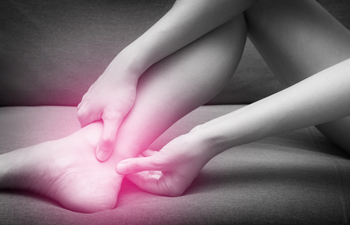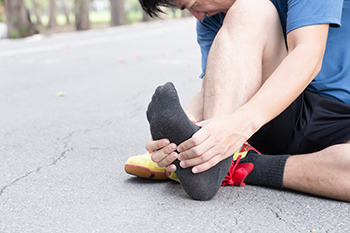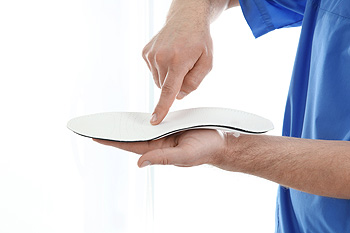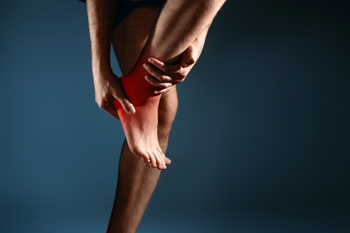Connect With Us
Blog
Items filtered by date: October 2023
Symptoms and Diagnosis of Achilles Tendonitis

Achilles tendonitis is an overuse injury that begins as a mild ache in the back of the leg or above the heel after running or other sporting activity. A key symptom of Achilles tendonitis is the sensation of pain, primarily felt in the calf muscles and extending down to the ankle. Stiffness in the calf muscles from this condition can limit the flexibility of the foot and make simple movements challenging. In some cases, bumps or nodules may form around the tendon, which can also be tender to the touch. In addition, the ankle joint may begin to swell. A podiatrist may use several diagnostic techniques to confirm the presence of the Achilles tendonitis. X-rays are typically the initial step to rule out other potential causes, but they cannot provide a direct view of the tendon. Ultrasound imaging is extremely beneficial, as it offers clear, real-time visuals of the tendon's internal structure. In severe cases, or when surgical intervention is under consideration, an MRI test is conducted to produce detailed images of the tendon's condition. Projection radiography is sometimes used to identify calcification deposits within the tendon, which can be responsible for up to 60 percent of Achilles tendonitis cases. If you suspect you may be suffering from Achilles tendonitis, it is suggested that you make an appointment with a podiatrist for an exam and suggestions on effective treatment methods.
Achilles tendon injuries need immediate attention to avoid future complications. If you have any concerns, contact one of our podiatrists of Advantage Foot and Ankle Center . Our doctors can provide the care you need to keep you pain-free and on your feet.
What Is the Achilles Tendon?
The Achilles tendon is a tendon that connects the lower leg muscles and calf to the heel of the foot. It is the strongest tendon in the human body and is essential for making movement possible. Because this tendon is such an integral part of the body, any injuries to it can create immense difficulties and should immediately be presented to a doctor.
What Are the Symptoms of an Achilles Tendon Injury?
There are various types of injuries that can affect the Achilles tendon. The two most common injuries are Achilles tendinitis and ruptures of the tendon.
Achilles Tendinitis Symptoms
- Inflammation
- Dull to severe pain
- Increased blood flow to the tendon
- Thickening of the tendon
Rupture Symptoms
- Extreme pain and swelling in the foot
- Total immobility
Treatment and Prevention
Achilles tendon injuries are diagnosed by a thorough physical evaluation, which can include an MRI. Treatment involves rest, physical therapy, and in some cases, surgery. However, various preventative measures can be taken to avoid these injuries, such as:
- Thorough stretching of the tendon before and after exercise
- Strengthening exercises like calf raises, squats, leg curls, leg extensions, leg raises, lunges, and leg presses
If you have any questions please feel free to contact our office located in Newark, DE . We offer the newest diagnostic tools and technology to treat your foot and ankle needs.
Preventing Plantar Fasciitis

Heel pain, often due to plantar fasciitis, results from chronic overuse of the plantar fascia, a thick tissue on the foot's sole that connects the heel bone to the toes and forms the arch. The most common symptom is heel pain which is typically at its worst with the first few steps after awakening. Causes encompass overuse, biomechanical abnormalities, tight or weak calf muscles, and big toe issues. Diagnosis involves a physical exam and may require imaging. This can be quite painful and interfere with comfortable functioning. It is better to try and prevent this condition than to experience it and have it treated. Preventative measures include calf stretching, plantar fascia stretches, weight management, supportive footwear, and possibly using custom-made orthotics. If you have heel pain or would like to know more about preventing it, it is suggested that you make an appointment with a podiatrist who can provide treatment and any information that can help you take the best care of your feet.
Plantar fasciitis can be very painful and inconvenient. If you are experiencing heel pain or symptoms of plantar fasciitis, contact one of our podiatrists from Advantage Foot and Ankle Center . Our doctors can provide the care you need to keep you pain-free and on your feet.
What Is Plantar Fasciitis?
Plantar fasciitis is the inflammation of the thick band of tissue that runs along the bottom of your foot, known as the plantar fascia, and causes mild to severe heel pain.
What Causes Plantar Fasciitis?
- Excessive running
- Non-supportive shoes
- Overpronation
- Repeated stretching and tearing of the plantar fascia
How Can It Be Treated?
- Conservative measures – anti-inflammatories, ice packs, stretching exercises, physical therapy, orthotic devices
- Shockwave therapy – sound waves are sent to the affected area to facilitate healing and are usually used for chronic cases of plantar fasciitis
- Surgery – usually only used as a last resort when all else fails. The plantar fascia can be surgically detached from the heel
While very treatable, plantar fasciitis is definitely not something that should be ignored. Especially in severe cases, speaking to your doctor right away is highly recommended to avoid complications and severe heel pain. Your podiatrist can work with you to provide the appropriate treatment options tailored to your condition.
If you have any questions please feel free to contact our office located in Newark, DE . We offer the newest diagnostic and treatment technologies for all your foot and ankle needs.
Get Professional Care for a Broken Foot or Ankle
Children’s Custom Orthotics

Children's orthotics may be needed to support their foot growth and development. However, knowing when to seek the counsel of a podiatrist is vital. Typically, before the age of three, concerns related to a child's gait naturally resolve as their muscles and foot structures mature. In these early years, orthotics are seldom necessary, and simple shoe adjustments or exercises may suffice. Yet, specific signs should prompt consultation. For example, flat feet can lead to joint pain and posture issues, warranting attention. Likewise, if a child's feet point inward or outward, it is crucial to address this to prevent long-term muscle imbalances and mobility problems. Some foot deformities, such as hammertoes and bunions can be corrected with orthotics if addressed promptly. Abnormal shoe wear, recurring foot pain, and rapid fatigue during physical activities can all indicate underlying foot problems. In most cases, custom foot orthotics effectively address these concerns, facilitating proper development without pain. If you have any questions about your child's foot health, it is suggested that you make an appointment with a podiatrist for professional guidance.
If you are having discomfort in your feet and would like to try orthotics, contact one of our podiatrists from Advantage Foot and Ankle Center . Our doctors can provide the care you need to keep you pain-free and on your feet.
What Are Orthotics?
Orthotics are inserts you can place into your shoes to help with a variety of foot problems such as flat feet or foot pain. Orthotics provide relief and comfort for minor foot and heel pain but can’t correct serious biomechanical problems in your feet.
Over-the-Counter Inserts
Orthotics come in a wide variety of over-the-counter inserts that are used to treat foot pain, heel pain, and minor problems. For example, arch supports can be inserted into your shoes to help correct overarched or flat feet, while gel insoles are often used because they provide comfort and relief from foot and heel pain by alleviating pressure.
Prescription Orthotics
If over-the-counter inserts don’t work for you or if you have a more severe foot concern, it is possible to have your podiatrist prescribe custom orthotics. These high-quality inserts are designed to treat problems such as abnormal motion, plantar fasciitis, and severe forms of heel pain. They can even be used to help patients suffering from diabetes by treating foot ulcers and painful calluses and are usually molded to your feet individually, which allows them to provide full support and comfort.
If you are experiencing minor to severe foot or heel pain, it’s recommended to speak with your podiatrist about the possibilities of using orthotics. A podiatrist can determine which type of orthotic is right for you and allow you to take the first steps towards being pain-free.
If you have any questions please contact our office located in Newark, DE . We offer the newest diagnostic and treatment technologies for all your foot and ankle needs.
Features of Running Shoes for Marathoners

When it comes to marathon running, a grueling 26.2-mile journey, selecting the ideal pair of running shoes can significantly affect your performance and overall foot health, as well as prevent injury. Here are some essential features to consider when choosing your marathon running shoes. Cushioning plays a vital role in marathon shoes. Select shoes with adequate midsole cushioning to absorb the shock generated by each stride. Arch support for proper foot alignment is essential to prevent overpronation or supination, either of which can lead to discomfort and potential injuries. Breathability is important, as running for extended periods can result in sweaty feet, which may lead to discomfort, infection, and even blisters. The weight of marathon shoes cannot be ignored. The lighter the shoe, the less fatigue your legs will experience over the long distance. Lastly, durability should not be underestimated. Marathon training and racing can put your shoes through significant wear and tear. To ensure your shoes last the distance, select pairs constructed from high-quality materials designed to withstand the rigors of marathon running. For additional help with selecting the right running shoes, it is suggested that you consult a podiatrist.
If you are a runner, wearing the right running shoe is essential. For more information, contact one of our podiatrists from Advantage Foot and Ankle Center . Our doctors can provide the care you need to keep you pain-free and on your feet.
Choosing the Right Running Shoe for Your Foot Type
To increase performance and avoid the risk of injury, it is important to choose the right running shoe based on your foot type. The general design of running shoes revolves around pronation, which is how the ankle rolls from outside to inside when the foot strikes the ground.
- Neutral runners are able to choose from a wide variety of shoes, including minimalist shoes or even going barefoot.
- Runners who overpronate, or experience an over-abundance of ankle rolling, should choose shoes that provide extra motion control and stability.
- Runners who underpronate, or supinate, have feet that have high arches and lack flexibility, preventing shock absorption. They require shoes with more flexibility and cushion.
If you have any questions please feel free to contact our office located in Newark, DE . We offer the newest diagnostic and treatment technologies for all your foot and ankle needs.
Discovering the Root Causes of Heel Pain

Heel pain is a common ailment that can be both uncomfortable and debilitating. To effectively address heel pain, it is important to understand its underlying causes, as they can vary widely. One prevalent culprit is plantar fasciitis, a condition marked by inflammation of the plantar fascia, a thick band of tissue that runs along the bottom of the foot. This condition often results from overuse, poor footwear choices, or excessive strain on the foot's arch. Achilles tendinitis is another leading cause of heel pain, stemming from inflammation of the Achilles tendon, located at the back of the heel. This condition can be triggered by intense physical activity, tight calf muscles, or inadequate warm-up routines. Heel spurs, bony growths on the heel bone, can also lead to discomfort, though they may not always be painful. Stress fractures, arthritis, nerve irritation, and obesity are additional factors that can contribute to heel pain. Wearing unsupportive shoes and making abrupt increases in physical activity levels can exacerbate these conditions. To effectively manage heel pain, it is essential to identify the specific cause through proper diagnosis. Treatment options may include rest, stretching exercises, orthotic devices, or, in some cases, medical interventions, depending on the severity and root cause of the pain. If you are experiencing heel pain, it is suggested that you visit a podiatrist who can diagnose the cause and offer a treatment plan that is right for you.
Many people suffer from bouts of heel pain. For more information, contact one of our podiatrists of Advantage Foot and Ankle Center . Our doctors can provide the care you need to keep you pain-free and on your feet.
Causes of Heel Pain
Heel pain is often associated with plantar fasciitis. The plantar fascia is a band of tissues that extends along the bottom of the foot. A rip or tear in this ligament can cause inflammation of the tissue.
Achilles tendonitis is another cause of heel pain. Inflammation of the Achilles tendon will cause pain from fractures and muscle tearing. Lack of flexibility is also another symptom.
Heel spurs are another cause of pain. When the tissues of the plantar fascia undergo a great deal of stress, it can lead to ligament separation from the heel bone, causing heel spurs.
Why Might Heel Pain Occur?
- Wearing ill-fitting shoes
- Wearing non-supportive shoes
- Weight change
- Excessive running
Treatments
Heel pain should be treated as soon as possible for immediate results. Keeping your feet in a stress-free environment will help. If you suffer from Achilles tendonitis or plantar fasciitis, applying ice will reduce the swelling. Stretching before an exercise like running will help the muscles. Using all these tips will help make heel pain a condition of the past.
If you have any questions please contact our office located in Newark, DE . We offer the newest diagnostic and treatment technologies for all your foot and ankle needs.




